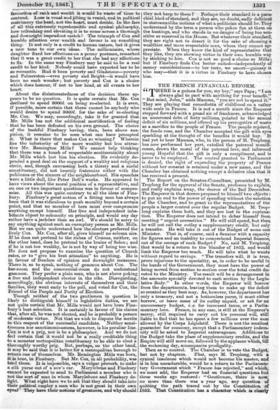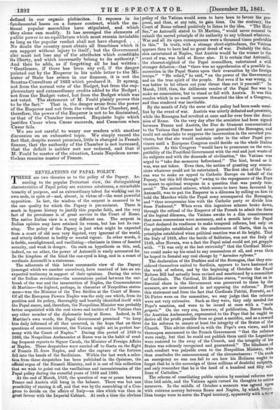THE FRENCH FINANCIAL REFORM. rrilERE is a guinea for you,
my boy," says Papa; "I am 1 always glad to part with anything for your benefit." "But mind, John," adds Mamma, "you are not to spend it." They are playing that comedietta of childhood on a rather wide scale in France. It is not a month since the Emperor stepped forward with a grand air of frankness, acknowledged an uncovered debt of forty millions, pointed to the annual deficit of six millions, and offered up his prerogative of waste as a sacrifice to the people of France. The people rejoiced, the funds rose, and the Chamber accepted the gift with eyes sparkling at the thought of the benefits it would buy. It had yet to hear Mamma, who, in the person of M. Troplong, has now performed her part, extolled the paternal munifi- cence, drawn the moral of the paternal love, and informed young Hopeful that the gift is only a compliment, and is never to be employed. The control granted to Parliament is denied, the right of expending the property of France without her consent is retained under a new name, and the Chamber has obtained nothing except a delusive idea that it has received a present.
The Report on the Senatus-Consultum, presented by M. Troplong for the approval of the Senate, protesses to explain, and really explains away, the decree of the 2nd December. The Emperor in that decree proposed to himself two objects : to put an end to the power of spending without the sanction of the Chamber, and to grant to the representatives of the people a larger control over the regular Budget. M. Trop- long explains them both, and they are lost in the explana- tion. The Emperor does not intend to debar himself from meeting "urgent necessities." He will still spend, but then he will not call the outlay a supplementary credit, but only a transfer. He will take it out of the Budget of some one Minister. That is, of course, said a Senator with a capacity for figures and an inability to comprehend Imperial finance, out of the savings of such Budget ? No, said M. Troplong, that would be a return to the blunder of 1852, and would limit the Emperor too much. He will take what he wants without regard to savings. "The transfers will, it is true, prove injurious to the speciality, as, in order to be useful in the hands of the Government, they must have the power of being moved from section to section over the total credit de- voted to the Ministry. The result will be a derangement in the amounts specially devoted to each section by the Legis- lative Body." In other words, the Emperor will borrow from the departments, leaving them to make up the deficit so created as they best may. As, however, the department has only a treasury, and not a bottomless purse, it must either borrow, or leave some of its outlay unpaid, or ask for an unnecessary budget, i. e. for increased taxes, or a Parlia- mentary loan. France, in any case, is still at the Emperor's mercy, still required to carry out his personal will, still liable to find that he has spent a few millions over the sum allowed by the Corps Legislatif. There is not the smallest guarantee for economy, except that a Parliamentary indem- nity will be asked to Imperial extravagance. Additions to the Budget take the place of supplementary credits, and the Empire will still move on, followed by the applause which, till the reckoning day, accompanies prodigality. Then as to control. The Chamber is to vote the Budget, but not by chapters. That, says M. Troplong, with a cynical insolence which would not become his master, and is in him unendurable, would be a return to the Parliamen- tary Government which "France bee rejected," and which, we must add, the Emperor had on financial questions but three weeks ago restored : "Gentlemen, there is now, no more than there was a year ago, any question of quitting the path traced out by the Constitution of 1852. That Constitution has a character which is clearly defined in our organic plebiscites. It reposes in its fundamental bases on a former contract, which the na- tional popular assemblies have stipulated, and which they alone can modify. It has arranged the elements of public power in an equilibrium which must remain inviolable as long as the popular verdict shall not have changed. . . . No doubt the country must obtain all franchises which it can support without injury to itself; but the Government also must not lose any of the attributes which constitite its liberty, and which necessarily belong to its authority." And then he adds, as if forgetting all he had written : "Gentlemen, if there has been any evil, if the danger pointed out by the Emperor in his noble letter to the Mi- nister of State has arisen in our finances, it is not the Senatus-Consultum of 1852 which produced it. It sprang, not from the normal vote of the Budget, but from the sup- plementary and extraordinary credits added to the Budget ; not from the Budget voted, but from the Budget which was not voted. The statement of M. Fould plainly proves this to be the fact." That is, the danger arose from the power of the Emperor and not from the votes of the Chamber, and, therefore, the power of the Emperor is not to be diminished, or that of the Chamber increased. Exquisite logic which justifies Ciesar when Cmsar succeeds, and Cmsansm when Ctesar fails.
We are not careful to weary our readers with another discussion on an exhausted topic. We simply record the fact that, despite recent promises, little is changed in French finance, that the authority of the Chamber is not increased, that the deficit is neither met nor reduced, and that if M. Fould be master of the situation, Louis Napoleon never. theless remains master of France.































 Previous page
Previous page